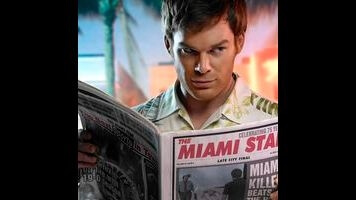Dexter: "Living the Dream"

I think I’d like Dexter to announce that its (already picked up) fifth season is going to be its final one. For all of the show’s virtues, at this point, it’s become incredibly obvious that the show has turned into the cable equivalent of a solid B-show, instead of the truly awesome subversion of the crime drama it could have been. To my mind, the show’s second season was easily its best, despite the fact that it also featured one of the show’s worst characters ever in the misconceived Lila. In that season, Dexter seemed at every turn to be in genuine danger of being caught, and even though it was obvious he would eventually slide out of his predicament with no one the wiser, the show expertly turned the screws to him by forcing him to deal with the fact that Doakes had figured out his secret, that the search for the Bay Harbor Butcher was always in danger of realizing he was said Butcher and that Lundy was always one or two clues away from reaching the same conclusion as Doakes.
The longer any show runs, the more that show is going to have to soften its characters, to some degree, simply because extended periods of time around anyone will mostly make you think more highly of them. What troubles me more is that Dexter, season two, was the only season to deal as directly as possible with the fact that what Dexter Morgan is doing – killing killers – is still immoral and illegal. Minus Doakes, the show doesn’t have anyone to voice that opinion, especially since Dexter has gotten so good at hiding what it is that he’s doing. Though the show’s other two seasons have come at this idea at various points, neither has engaged with it as fully as the material probably requires, since we have to see Dexter, to some degree, as a lovable hero if we’re going to keep watching. Other shows with antiheroes solved this problem by surrounding the antihero with a variety of compelling supporting characters, but Dexter has never quite solved this problem and, instead, chooses to deal with this problem by bringing in a new guest serial killer or two every season.
This season, the show has brought on John Lithgow as the Trinity Killer, the great white whale of Lundy (who’s back, retired and occasionally tracking the serial killer no one will believe him exists). He doesn’t get much to do in the premiere, but damned if he isn’t terrifying all the same. The opening moments of him slicing a girl in the thigh and letting her bleed out in her bathtub as he cradles her, naked, push the show’s horror quotient way up (and are almost demonically filmed), while the later scene of him standing alone in a rusty old public shower and pushing the water hotter and hotter while moaning loudly is also sublimely creepy. I rather liked the story featuring Jimmy Smits’ Miguel last season when it finally got going (which took a long while), but so long as this one doesn’t stay disconnected from the main players for too long, Lithgow’s tossing off of his comedic persona of recent years is compelling enough that it easily becomes the episode’s highlight.
I was fully prepared to have all of the stuff featuring the non-Dexter cops to be kinda boring, since it’s always kinda boring. Yeah, Deb and Anton are settling into their relationship, and Quinn is flirting with a reporter or something (I’m not sure why this matters just yet, but it might end up being important though I’m not holding my breath). And I suppose it’s a “shock” that Angel and Laguerta are having an affair, but it would be more of a shock were either of these characters developed beyond a stock series of character traits. I get that the temptation in writing this show is probably to load up on the Dexter monologuing and creepy horror sequences, but it’s seriously hindered the series’ long-term lifespan, simply because none of these characters are terribly interesting, outside of MAYBE Masuka, who’s only interesting insofar as it’s fun to see him interact with Dexter.








































